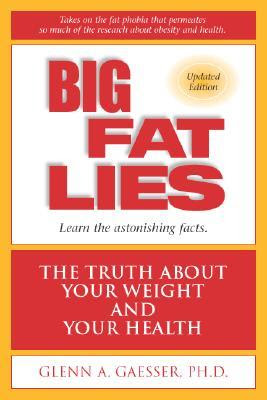Big Fat Lies: The Truth About Your Weight and Your Health (Review)
Authors: Glenn A. Gaesser
Date Published: July 22, 2002
Publisher: Gürze Books
Edition: paperback
ISBN-13: 9780936077420
Size: 320
goodreads amazon
In this authoritative, easy-to-read book, Glenn Gaesser, an exercise physiologist, challenges the conventional wisdom that excess body fat poses a danger to health. He explains that it is the fat in your diet — not your weight — that is harmful, and presents scientific evidence of the benefits of body fat. In addition, Gaesser presents a “20/20 program” for achieving optimal health and metabolic fitness through 20 minutes of daily moderate exercise and a complex-carbohydrate eating plan. This edition includes a new introduction and updated research. “Challenges the common beliefs that ‘thin is best’ and ‘weight loss improves health.’ ” — Pat Lyons, author of Great Shape
Review:
You've probably heard of the fitness adage "Calorie in, Calorie out" which states that you would shed some pounds if your calorie expenditure is higher than the calorie you take in. Because of this, those who want to get their desired looks rather than get fit would want to lose weight by starving themselves, underestimating the body's capability to store energy when it thinks it's going through famine.
Few people who lose weight (by depriving themselves of food) can keep it off, they would likely gain back what they lost after readjusting to their previous eating habit. So they go into this endless cycle of weight loss and gain, with results that can be extremely detrimental to health, and in some cases even fatal. This book stipulates that yo-yo dieting do more harm than good.
Like what the title suggests, this book will illustrate that being fat does not mean having a higher mortality rate than being thin by discussing various studies concerning weight. This book will tell you that having a sedentary lifestyle gives the high risk factor for mortality.
Active obese people have 50% mortality rate to that of the mortality rate for stagnant lean people. Being fat does not mean you are more prone to having cardiovascular diseases or coronary artery disease than the thin counterpart. In fact, this book suggests that more of thin people die earlier and die from the mentioned diseases than obese people.
While all that sound unbelievable, Glenn Gaesser offers lots of backup studies that the media and even health authority ignored for decades, with the weight-loss industry giving billions of dollars revenue in the USA.
I have to say, I'm not a fan of being fat. If there's a reason for me to shed some pounds, that's because I want to look the best that I could be. If there's anything I truly accept from this book, that's not to fall in all these diet fads. Proper nutrition and exercise are the key to good health, not starvation. But then no matter what, I'd never want to look fat.
One has to take note that this book was published on 2002. On 2010, studies have showed that the average lifespan of Japanese people is 85 years old and in the whole world, they have the lowest mortality rate. The average Japanese is very thin in frame and studies suggest their longevity is primarily owed to their eating habits. They generally eat food rich in omega-3 and omega-6 fatty acids.
If this book claimed that studies leaning on being thin as healthy to be flawed, so is the author with his positive assumptions about being fat.




This comment has been removed by the author.
ReplyDeleteAfter reading your article, I have realized that you also need to write an article about Physical therapy. Your writing skills are good and people will love it when you talk about it.
ReplyDeleteWith elizavecca cer 100, bid dull hair farewell! My go-to product for getting salon-quality hair at home is Elizavecca Cer-100. Including CER 100 in your regimen is the best option if you want to improve your appearance without much effort
ReplyDeleteThe beauty of joseon dynasty cream has convinced me to try a new cleaning balm even if I was hesitant to do so. My makeup and pollutants are successfully removed without depleting my skin of its natural oils. I adore it
ReplyDelete